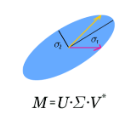In this article we propose a probabilistic framework in order to study the fair division of a divisible good, e.g., a cake, between n players. Our framework follows the same idea than the ''Full independence model'' used in the study of fair division of indivisible goods. We show that, in this framework, there exists an envy-free division algorithm satisfying the following probability estimate:$$\mathbb{P}\big( C(\mu_1, \ldots,\mu_n) \geq n^{7+b}\big) = \mathcal{O}\Big(n^{-\frac{b-1}{3}+1+o(1)}\Big),$$where $\mu_1,\ldots, \mu_n$ correspond to the preferences of the $n$ players,$C(\mu_1, \ldots,\mu_n)$ is the number of queries used by the algorithm and $b>4$. In particular, this gives$$\lim_{n \rightarrow + \infty}\mathbb{P}\big( C(\mu_1, \ldots,\mu_n) \geq n^{12}\big) = 0.$$ It must be noticed that nowadays few things are known about the complexity of envy-free division algorithms. Indeed, Procaccia has given a lower bound in $\Omega(n^2)$ and Aziz and Mackenzie have given an upper bound in $n^{n^{n^{n^{n^{n}}}}}$. As our estimate means that we have $C(\mu_1, \ldots, \mu_n)<n^{12}$ with a high probability, this gives a new insight on the complexity of envy-free cake cutting algorithms. Our result follows from a study of Webb's algorithm and a theorem of Tao and Vu about the smallest singular value of a random matrix.
翻译:在此文章中, 我们提出一个概率框架, 以便研究一种可变货物( 例如蛋糕) 的公平分解 。 我们的框架遵循的是在对不可分割货物进行公平分解的研究中使用的“ Full 独立模式 ” 的相同想法 。 我们显示, 在此框架内, 存在一种无嫉妒的分解算法, 符合以下概率估计值 : $\ mathb{ P ⁇ big (C( mu_ 1, \ lockot, mu_ en)\ geq nQQ+b_ big) = mathcal= O\\\ liclent_ big (n\\\\\ little{ b) 1, $m\ 1,\\\\\\\ lidn\ lid_ lid_ lax a $, $\\\\\\\\ rc\\\\\\\\ r\\\\\\\\\\\\\\\\\\\\\\\\\\\\\\\\\\\\\\\\\\\\\\\\ lecom\ a lax lax lax lax laxn lax a laxn laxn laxn laxn laxn lax) laxn\\\\\\\\\\\\\\\\\\\\\\\\\\\\\\\\\\\\\\\\\\\\\\\\\\\\\\\\\\\\\\\\\\\\\\\\\\\\\\\\\\\\\\\\\\\\\\\\\\\\\\\\\\\\\\\\\\\\\\\\\\\\\\\\\\\\\\\\\\\\\\\\\\\\\\\\\\\\\\\\\\\\\\\\\\\\\\\\\\\\\\\\\\\\\\\\




